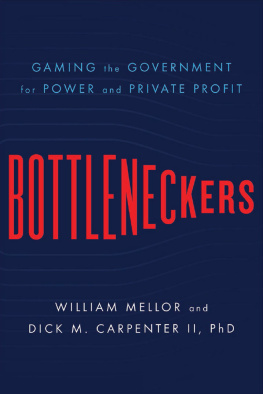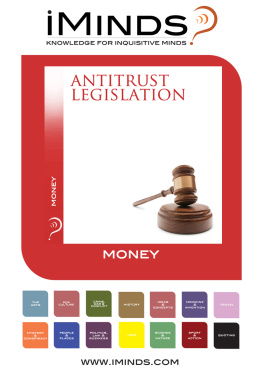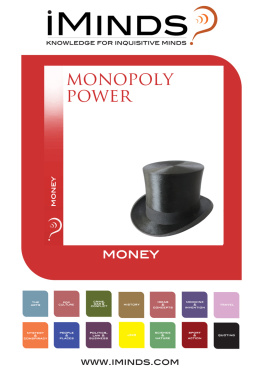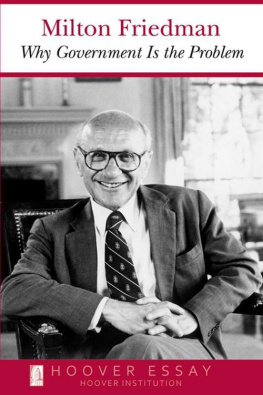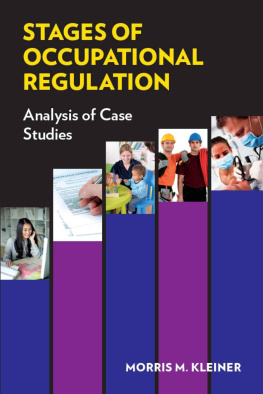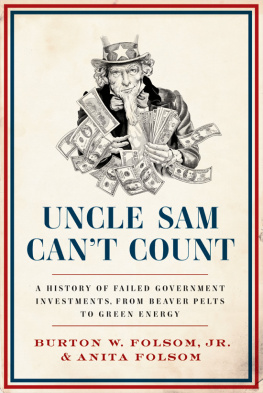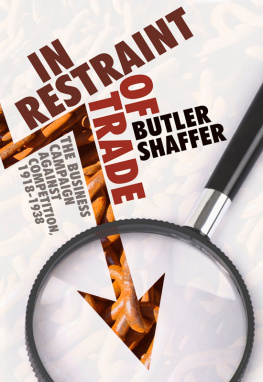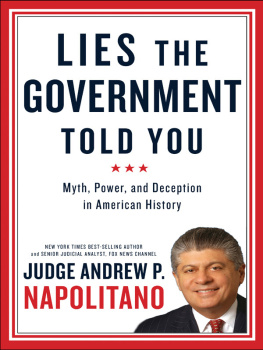

2016 by William Mellor and Dick M. Carpenter II, PhD
All rights reserved. No part of this publication may be reproduced, stored in a retrieval system, or transmitted, in any form or by any means, electronic, mechanical, photocopying, recording, or otherwise, without the prior written permission of Encounter Books, 900 Broadway, Suite 601, New York, New York, 10003.
First American edition published in 2016 by Encounter Books,
an activity of Encounter for Culture and Education, Inc.,
a nonprofit, tax exempt corporation.
Encounter Books website address: www.encounterbooks.com
FIRST AMERICAN EDITION
LIBRARY OF CONGRESS CATALOGING-IN-PUBLICATION DATA
Names: Mellor, William H., author. | Carpenter, Dick M. (Dick Michael), author.
Title: Bottleneckers: gaming the government for power and private profit / by William Mellor and Dick M. Carpenter II, PhD.
Description: New York: Encounter Books, 2016. | Includes bibliographical references and index.
Identifiers: LCCN 2016020839 (print) | LCCN 2016033220 (ebook) | ISBN 9781594039089 (ebook)
Subjects: LCSH: LicensesUnited StatesHistory. | Trade regulationUnited StatesHistory. | Trade associationsUnited StatesHistory.
Classification: LCC HD3630.U6 M45 2016 (print) | LCC HD3630.U6 (ebook) | DDC 381.30973dc23
LC record available at https://lccn.loc.gov/2016020839
Interior page design and composition: BooksByBruce.com
Dedication
We dedicate this book to Institute for Justice clients who have courageously and successfully stood up to bottleneckers and, in doing so, paved the way for countless others to pursue an honest living.
Bottlenecker(n): a person who advocates for the creation or perpetuation of government regulation, particularly an occupational license, to restrict entry into his or her occupation, thereby accruing an economic advantage without providing a benefit to consumers.
Table of Contents
















Some criminals begin at a young age.
Matt Molinari and Eric Schnepf of Bound Brook, New Jersey, tangled with the law at the age of eighteen.
Nathan Duszynski of Holland, Michigan, was thirteen.
Madison Root of Portland, Oregon, was only eleven.
They are not unique. All across the country in recent years, teens, preteens, and children have had run-ins with police, health inspectors, security guards, and even zoning officials, all for the same crime. The circumstances have sometimes been so disgraceful that the stories made national news. In certain cases, community leaders have expressed outrage and even shame, while in other instances officials have noted the young ages of the offenders but concluded that the law had to be applied without prejudice.
The young criminals were all guilty of... conducting business without a license.
Amid record snowfalls on the East Coast in early 2015, Matt and Eric canvased neighborhoods and shoveled snow for money, until they were stopped by police. Nathan set up a hotdog stand to raise money to help his disabled parentshis mom has epilepsy and his dad has multiple sclerosis. Within ten minutes of opening his stand, a zoning official closed him down because he was competing with nearby restaurants. Madison sought to sell Christmas mistletoe in a local park to pay for her braces. She was told that while she could not sell her wares without a license, she was free to beg for money.
I dont want to beg! Madison exclaimed. I would rather work for something than beg.
Madison didnt know how right she was. In that one statement, the eleven-year-old described one of the most significant labor economics problems in the United States today. In cities, counties, and states across the country, codebooks are stuffed with laws prohibiting people from workingmany laws, like those that shut down Matt, Eric, Nathan, Madison, and countless young lemonade stand entrepreneurs each year, doing so for no rational reason.
Its called occupational licensure. Simply put, an occupational license is a government-issued permission slip allowing a person to work. Although some occupational and professional licenses are familiar, such as those for physicians or attorneys, others are less well known, such as those for interior designers, locksmiths, auctioneers, sign language interpreters, music therapists, florists, and many other occupations.
States (and sometimes cities or counties) require that people wishing to work in such occupations go through often-arbitrary anticompetitive hurdles, like completing mandatory education and training, passing examinations, paying fees, and reaching a prescribed age. Those who cannot clear the required hurdles are prohibited from working in the occupation. Because these hurdles are often purposefully high, occupational licensing is a rare public policy that accomplishes precisely what it sets out to dokeep people out of the occupation.
States that license interior designers, for example, require six years of education and experience, successful passage of a costly national examination, and payment of several hundred dollars in fees to the state. The result is fewer economic opportunities for workers and entrepreneurs, fewer choices and higher prices for consumers, and artificially inflated wages and profits for those already in the industry.
Historically, the interruption of the flow of workers into occupations effected by licensing successfully preserved the advantages of those already at work in those occupations. And the economic advantages of licensingfor the licensedhave not gone unnoticed. In 1776, the economist Adam Smith observed that trades conspire to reduce the availability of skilled craftspeople in order to raise wages.
After 240 years, it seems that little has changed. By the 1940s, some observers were already comparing occupational licensing in the United States to the medieval guild system,
And like the medieval guild system, new licenses are created by governments at the request of those already working within an industry, typically through professional associations. Currently, those already working in an occupation (the modern equivalent of craftspeople) often band together and work in association with legislators (the equivalent of town councils and other civic structures) to create a regimented license to shut out those who have not completed the designated requirements (i.e., nonguild members) in order to maintain a monopoly over their occupation. Representatives of those associations often warn of hyperbolic threats to public health and safety from the specter of unregulated practiceillustrating the need for licensing with a few doomsday anecdotes and no empirical evidenceand conveniently provide sample licensing legislation written by the association. Since occupational licensing is primarily handed out at the state level, it is a process repeated in one state capitol after another, usually as part of a deliberate campaign to regulate the industry.
Next page
